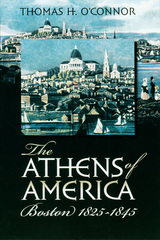
In this book, historian Thomas H. O'Connor sets the matter straight by showing that Boston's eminence during the first half of the nineteenth century was the result of a much broader community effort. After the nation emerged from its successful struggle for independence, most Bostonians visualized their city not only as the Cradle of Liberty, but also as the new world's Cradle of Civilization.
According to O'Connor, a leadership elite, composed of men of prominent family background, Unitarian beliefs, liberal education, and managerial experience in a variety of enterprises, used their personal talents and substantial financial resources to promote the cultural, intellectual, and humanitarian interests of Boston to the point where it would be the envy of the nation. Not only did writers, scholars, and philosophers see themselves as part of this process, but so did physicians and lawyers, ministers and teachers, merchants and businessmen, mechanics and artisans, all involved in creating a well-ordered city whose citizens would be committed to the ideals of social progress and personal perfectibility.
To accomplish their noble vision, leading members of the Boston community joined in programs designed to cleanse the old town of what they felt were generations of accumulated social stains and human failures, and then to create new programs and more efficient institutions that would raise the cultural and intellectual standards of all its citizens. Like ancient Athens, Boston would be a city of great statesmen, wealthy patrons, inspiring artists, and profound thinkers, headed by members of the "happy and respectable classes" who would assume responsibility for the safety, welfare, and education of the "less prosperous portions of the community."
Designed for the general reader and the historical enthusiast, The Athens of America is an interpretive synthesis that explores the numerous secondary sources that have concentrated on individual subjects and personalities, and draws their various conclusions into a single comprehensive narrative.

From its origins as a Puritan settlement on the Shawmut Peninsula to the multicultural capital of the knowledge industry that it is today, the city of Boston has played a significant role in our nation's history. In this book, the preeminent historian of Boston, Thomas H. O'Connor, takes readers on a delightful tour of the city, past and present. Drawing on lifelong acquaintance as a native son and scholar, O'Connor has assembled a personal, informal, and eclectic series of essays about Boston's people, places, and events.
Along the way you will meet figures of national significance and local heroes (or rogues), from John Adams and Phillis Wheatley to "Honey Fitz" and the Brink's gang; visit spaces sacred and profane, from the African Meeting House and Holy Cross Cathedral to Filene's Basement and the L Street Bathhouse; learn about institutions of civic importance and local color, from the Museum of Fine Arts and Massachusetts General Hospital to private clubs and nightspots; and be enlightened about the lore surrounding such quintessentially Boston topics as baked beans, the Curse of the Bambino, and the Steaming Kettle.
Boston A to Z wears its learning lightly but never fails to inform as it entertains. While celebrating some of Boston's finest achievements, it doesn't shy away from darker episodes. Longtime residents will find enlightenment about familiar and arcane aspects of their city, and visitors or newcomers will enjoy an engaging introduction to the life, culture, and history of Boston.

The history of Boston is inseparable from the life stories of its people--from the Puritans and Native Americans of the seventeenth century to the civic leaders and celebrities of today. In Eminent Bostonians, Thomas H. O'Connor, the preeminent historian of Boston, offers a personal selection of entertaining and enlightening brief lives of notable residents of the city.
Eminent Bostonians includes some 130 figures of local and national significance from the arts, literature, religion, politics, science and medicine, business, education, and sports. Some would be on every list of prominent Bostonians, and some will come as a genuine surprise. As at a large dinner party, part of the fun is seeing who is seated next to whom: the fictional Proper Bostonian George Apley, a creation of John P. Marquand, followed by Anthony Athanas, the Albanian immigrant owner of Anthony's Pier 4 restaurant, followed by Crispus Attucks, a victim of the Boston Massacre in 1770. Or Lucy Stone, a pioneering feminist, next to Gilbert Stuart, the eighteenth-century portraitist, next to John L. Sullivan, the early-twentieth-century champion boxer. Or the Red Sox legend Ted Williams between Phillis Wheatley, an eighteenth-century African-American poet, and the Puritan founder John Winthrop.
And so it goes, from Abigail Adams to Leonard P. Zakim: a gallery of Brahmins and immigrants, workers and scholars, reformers and reactionaries, dreamers and schemers. Eminent Bostonians introduces longtime residents and newcomers alike to their neighbors--those who made Boston what it was and what it is today.
READERS
Browse our collection.
PUBLISHERS
See BiblioVault's publisher services.
STUDENT SERVICES
Files for college accessibility offices.
UChicago Accessibility Resources
home | accessibility | search | about | contact us
BiblioVault ® 2001 - 2024
The University of Chicago Press









